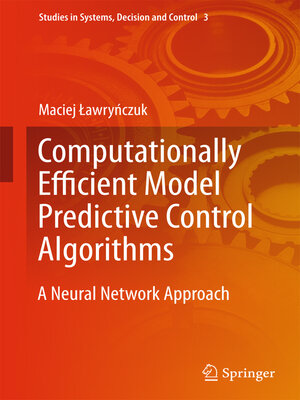Computationally Efficient Model Predictive Control Algorithms
ebook ∣ A Neural Network Approach · Studies in Systems, Decision and Control
By Maciej Ławryńczuk

Sign up to save your library
With an OverDrive account, you can save your favorite libraries for at-a-glance information about availability. Find out more about OverDrive accounts.
Find this title in Libby, the library reading app by OverDrive.



Search for a digital library with this title
Title found at these libraries:
| Loading... |
This book thoroughly discusses computationally efficient (suboptimal) Model Predictive Control (MPC) techniques based on neural models. The subjects treated include:
· A few types of suboptimal MPC algorithms in which a linear approximation of the model or of the predicted trajectory is successively calculated on-line and used for prediction.
· Implementation details of the MPC algorithms for feed forward perceptron neural models, neural Hammerstein models, neural Wiener models and state-space neural models.
· The MPC algorithms based on neural multi-models (inspired by the idea of predictive control).
· The MPC algorithms with neural approximation with no on-line linearization.
· The MPC algorithms with guaranteed stability and robustness.
· Cooperation between the MPC algorithms and set-point optimization.
Thanks to linearization (or neural approximation), the presented suboptimal algorithms do not require demanding on-line nonlinear optimization. The presented simulation results demonstrate high accuracy and computational efficiency of the algorithms. For a few representative nonlinear benchmark processes, such as chemical reactors and a distillation column, for which the classical MPC algorithms based on linear models do not work properly, the trajectories obtained in the suboptimal MPC algorithms are very similar to those given by the ''ideal'' MPC algorithm with on-line nonlinear optimization repeated at each sampling instant. At the same time, the suboptimal MPC algorithms are significantly less computationally demanding.






